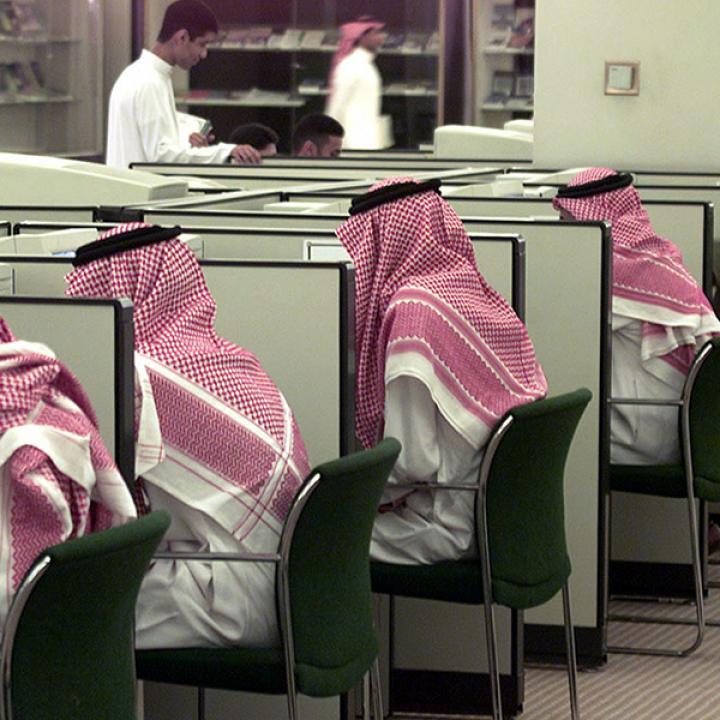
- Policy Analysis
- Articles & Op-Eds
The Other Khashoggis: Dissidents in Danger Across the Middle East
Also published in Newsweek

With militia targeting of activists on the rise, Western officials need to name the perpetrators, hold them accountable, and support homegrown democratic movements before they are snuffed out for good.
On February 3, gunmen assassinated Lokman Slim, an outspoken critic of Lebanese Hezbollah. Though the U.S. government preferred to await definitive proof (which may never come) before calling out the culprits, the murder was almost certainly the doing of Hezbollah, which has killed scores of senior politicians, and even a prime minister, with impunity since the 1980s.
Slim’s murder is not an isolated event, nor even simply part of a pattern. Dissidents in the Middle East are being killed on an industrial scale. According to Lebanese human rights institutions, assaults on journalists by state actors have increased from 20 in 2019 to 60 in 2020.
The killing of dissidents and next-generation political leaders by governments and militias is no longer a niche human rights issue, and it is not limited to Lebanon. It is increasingly being systematized at sufficient scale to kill off an entire rising generation of political reformers in multiple countries, shattering faith in electoral processes and strangling hopes for political change and stabilization in the Middle East.
In Iraq, for instance, the corollary of Slim’s murder was the June 6, 2020, fatal shooting of Hisham al-Hashemi, an equally outspoken critic of Kata’ib Hezbollah, the Iraqi version of Lebanon’s super-militia. Hashemi’s death is one of 30 killings of prominent activists and civil society figures at the hands of militias since October 2019.
And, of course, writer and dissident Jamal Khashoggi suffered the same fate at the hands of a Saudi government hit squad in Istanbul on October 2, 2018. Khashoggi’s murder should have been a wake-up call for all governments that value democracy to hold murderers publicly accountable and to provide meaningful support to dissidents still in the line of fire. Unfortunately, the tepid response of the previous U.S. administration to the Khashoggi killing only emboldened despots and fanatics in the Middle East. If activists cannot be bribed, beaten, censored, exiled or cowed into silence they are killed. For every high-profile Khashoggi there are dozens of lesser-known victims; for every murdered dissident there are untold numbers who abandon the cause in fear for their lives.
President Joe Biden has signaled that he will take a different approach than his predecessor did: human rights and mutual support between democracies are to be pillars of his foreign policy. On the campaign trail, Biden criticized Donald Trump for “taking the word of autocrats, while showing disdain for democrats.” In his inaugural address, he noted the importance of restoring U.S. soft power, pledging, “We will lead not merely by the example of our power, but by the power of our example.”
Biden’s national security adviser, Jake Sullivan, likewise called for a foreign policy aimed at “combating corruption and kleptocracy and neofascism”—all of which apply perfectly to the burgeoning militia states in Lebanon and Iraq. And for the first time, the National Security Council has a coordinator for democracy and human rights.
Colin Kahl, Biden’s new undersecretary for policy at the Pentagon, spoke in August 2020 of the need for U.S. foreign policy that can “rally the democratic nations to preserve what we have” by “defending the existing frontiers of the free world.” For many members of the Biden administration—especially veterans of the Obama years—this is a chance to address the mistakes of the U.S. response to the Arab Spring, now marking its 10th anniversary. Secretary of State Antony Blinken, who served as Obama’s deputy national security adviser and deputy secretary of state, stated that in Syria, the Obama administration “has to acknowledge that we failed, not for want of trying, but we failed.”
The Arab Spring echoed again in October 2019 when protesters, inspired by the examples of murdered dissidents, took to the streets of Lebanon and Iraq in opposition to the endemic corruption and cronyism of their governments. Iran-backed militias in both countries violently attacked those demonstrators, killing many.
The young people at the forefront of these movements are fed up with the repressive status quo. Demographics and globalization indicate that they are the future of the region, as long as they get the support they need. The U.S. government should recognize that the accelerating pace of dissident slayings in Lebanon and Iraq, while distressing, is a sign that militias in both countries are fearful of the next generation of political activists. These activists need Western support now more than ever. It also behooves the U.S. to keep applying human rights sanctions and the Magnitsky Act to Hezbollah and militias in Iraq in order to draw attention to their crimes and, just as importantly, to signal to struggling reformers that the United States recognizes their plight.
Sensing the Biden administration’s change of policy, Saudi Arabia released Loujain al-Hathloul, who spent almost three years in custody for her advocacy for women’s right to drive. The move is a positive first step that demonstrates the influence—and potential—of American leadership. The U.S. can further honor the memories of Slim, al-Hashemi, Khashoggi and countless unknown activists by naming their murderers and holding them accountable, and by supporting their homegrown democratic movements before they are snuffed out for good.
Hanin Ghaddar is the Friedmann Fellow in The Washington Institute’s Geduld Program on Arab Politics and former managing editor of NOW Lebanon. Michael Knights is the Institute’s Bernstein Fellow, specializing in the military and security affairs of Iraq, Iran, Yemen, and the Gulf Arab states. This article was originally published on the Newsweek website.




